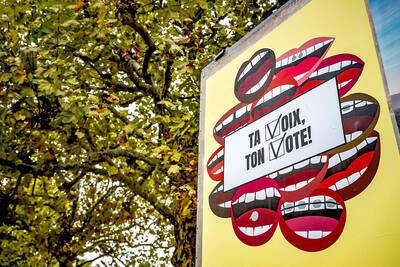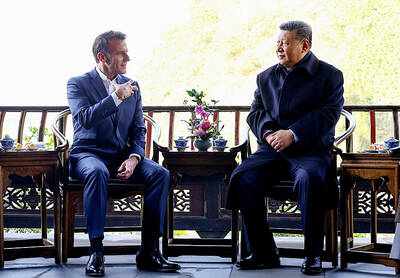Nepal's anti-monarchy protests spread to the usually off-limits tourist district in Kathmandu yesterday, with hundreds of people chanting slogans against King Gyanendra and burning tires on the street.
Police arrested four people during the protest in the Thamel district, a maze of alleys full of backpacker hotels, bars, curio shops and trekking and travel agencies which is a magnet for most tourists entering the country.
Protests were held elsewhere in the city as well, with vehicles off the street on the 11th day of a general strike called by political parties. Around 20 people were detained during a protest by journalists.
Since Sunday is not a day off in Nepal, many people could be seen walking to work down Kathmandu's main thoroughfares.
"We will burn the crown and run the country," youths shouted as they danced around burning tires in the center of Thamel. "Death to the government."
Meanwhile, Nepal's capital faced shortages of fresh food, cooking gas and gasoline. Vendors said fresh green vegetables were unavailable and they were running out of the potatoes and onions they had in storage.
The strike has forced trucks off the highways, the only means of transporting goods and supplies in this mountainous nation with no train tracks. Only a handful of stores remained open yesterday.
"We have not had a single truck come in the past 11 days. Whatever we are selling was what we had in stock, or grown locally in Kathmandu," said Raj Maharjan, who was selling a few bundles of green onion at the Baneswor vegetable market.
Vegetable prices have risen fivefold, chicken and mutton prices have doubled and gas for cooking was scarce.
Only a few vehicles were plying the streets, and the bus station in the city center was also deserted.
"We have not had any buses leave on long distance routes. Thousands of passengers have been stranded, but we are not sure when the strike will end," said Ramesh Gurung, a bus driver who was playing cards with fellow drivers.
"I have only a little money left and no relatives in Kathmandu. I need to get home to Butwal [in south Nepal] but I have been stuck away from my family," said Madhav Silwal, a milk farmer.
The Civil Aviation Authority said most of the internal and international flights were taking off on schedule. However, the majority of the population cannot afford to buy air tickets.
Thousands of pro-democracy protesters have been demonstrating every day in the streets of Kathmandu and major cities and towns since April 6 when the alliance of seven main opposition parties called the general strike to protest King Gyanendra's rule.
Many protests have ended in clashes with security forces, who have already shot dead four people.
The protests are the worst unrest Gyanendra has faced since he sacked the government and seized power 14 months ago.
The king said he took control to restore political order and end a communist insurgency that has left nearly 13,000 people dead in the past decade and made holding elections impossible.
The seven main opposition parties decided late on Friday to continue with the strike and protests after Gyanendra offered few concessions in a message he delivered to mark Nepal's New Year.

PARLIAMENT CHAOS: Police forcibly removed Brazilian Deputy Glauber Braga after he called the legislation part of a ‘coup offensive’ and occupied the speaker’s chair Brazil’s lower house of Congress early yesterday approved a bill that could slash former Brazilian president Jair Bolsonaro’s prison sentence for plotting a coup, after efforts by a lawmaker to disrupt the proceedings sparked chaos in parliament. Bolsonaro has been serving a 27-year term since last month after his conviction for a scheme to stop Brazilian President Luiz Inacio Lula da Silva from taking office after the 2022 election. Lawmakers had been discussing a bill that would significantly reduce sentences for several crimes, including attempting a coup d’etat — opening up the prospect that Bolsonaro, 70, could have his sentence cut to

A plan by Switzerland’s right-wing People’s Party to cap the population at 10 million has the backing of almost half the country, according to a poll before an expected vote next year. The party, which has long campaigned against immigration, argues that too-fast population growth is overwhelming housing, transport and public services. The level of support comes despite the government urging voters to reject it, warning that strict curbs would damage the economy and prosperity, as Swiss companies depend on foreign workers. The poll by newspaper group Tamedia/20 Minuten and released yesterday showed that 48 percent of the population plan to vote

A powerful magnitude 7.6 earthquake shook Japan’s northeast region late on Monday, prompting tsunami warnings and orders for residents to evacuate. A tsunami as high as three metres (10 feet) could hit Japan’s northeastern coast after an earthquake with an estimated magnitude of 7.6 occurred offshore at 11:15 p.m. (1415 GMT), the Japan Meteorological Agency (JMA) said. Tsunami warnings were issued for the prefectures of Hokkaido, Aomori and Iwate, and a tsunami of 40cm had been observed at Aomori’s Mutsu Ogawara and Hokkaido’s Urakawa ports before midnight, JMA said. The epicentre of the quake was 80 km (50 miles) off the coast of

RELAXED: After talks on Ukraine and trade, the French president met with students while his wife visited pandas, after the pair parted ways with their Chinese counterparts French President Emmanuel Macron concluded his fourth state visit to China yesterday in Chengdu, striking a more relaxed note after tough discussions on Ukraine and trade with Chinese President Xi Jinping (習近平) a day earlier. Far from the imposing Great Hall of the People in Beijing where the two leaders held talks, Xi and China’s first lady, Peng Liyuan (彭麗媛), showed Macron and his wife Brigitte around the centuries-old Dujiangyan Dam, a World Heritage Site set against the mountainous landscape of Sichuan Province. Macron was told through an interpreter about the ancient irrigation system, which dates back to the third century